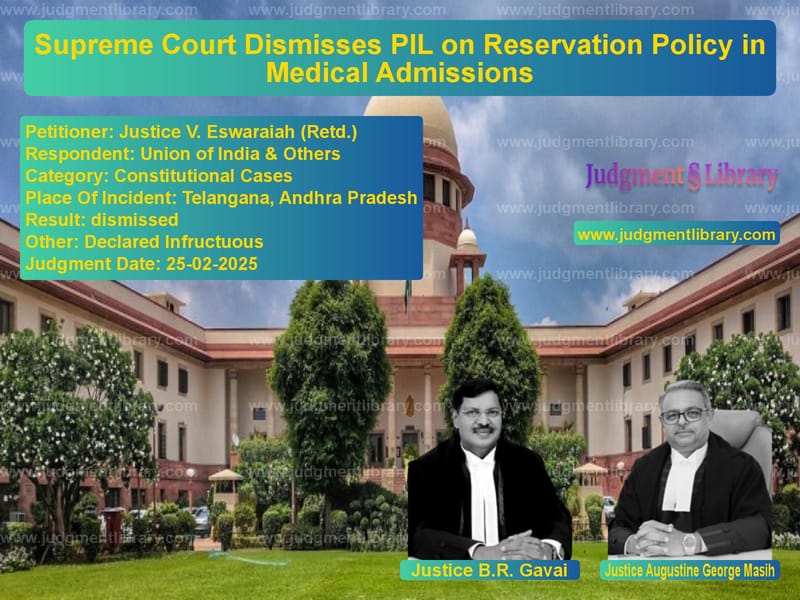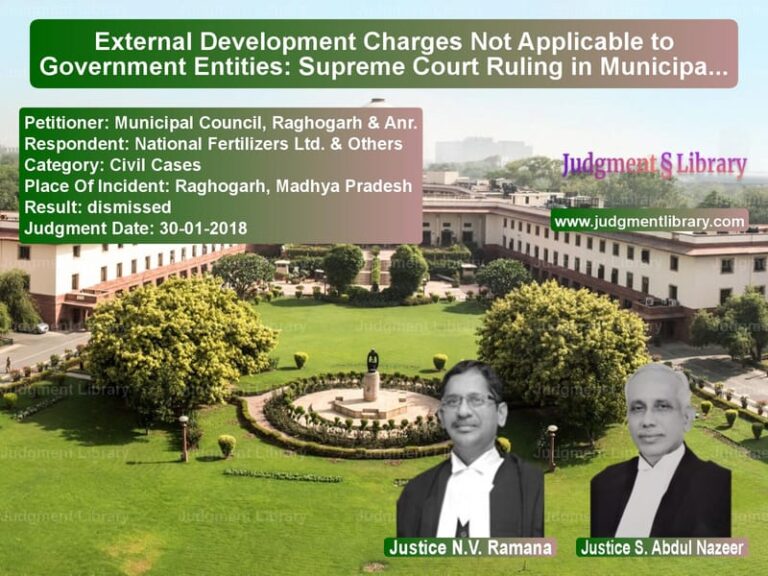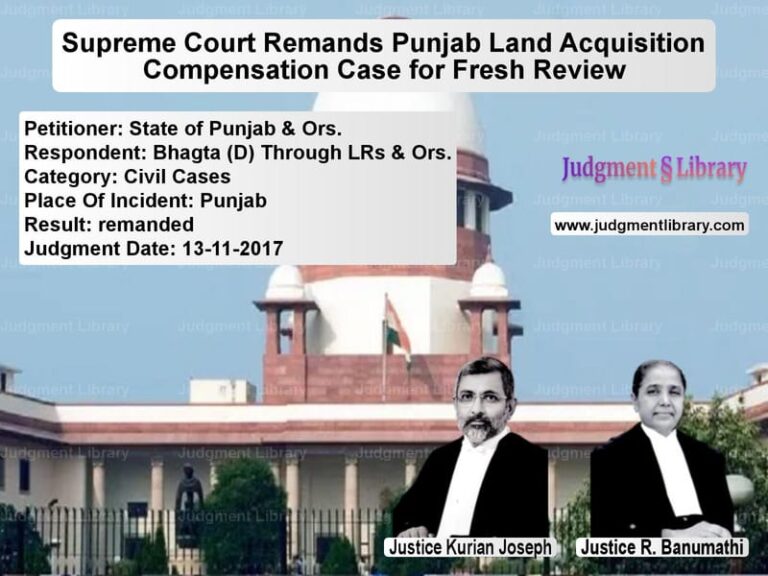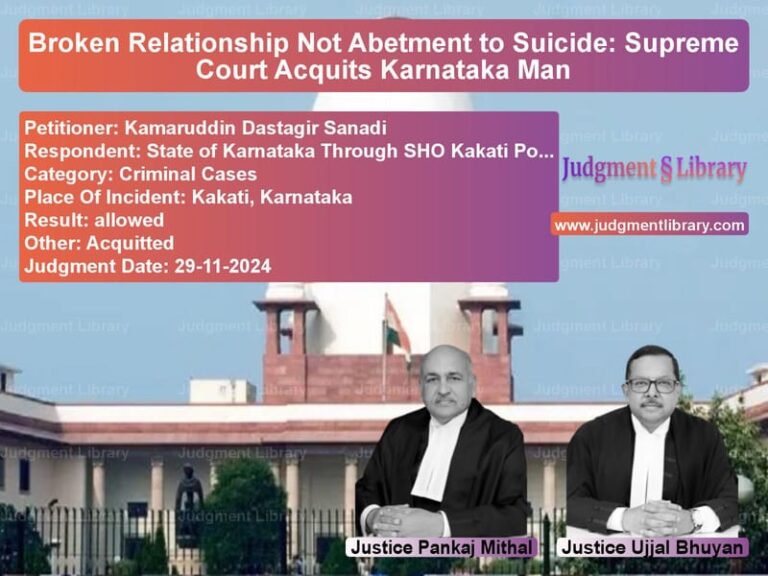Supreme Court Dismisses PIL on Reservation Policy in Medical Admissions
The Supreme Court of India recently ruled in the case of Justice V. Eswaraiah (Retd.) vs. Union of India & Others, dismissing a Public Interest Litigation (PIL) that sought modifications in the reservation policy concerning medical admissions in the states of Andhra Pradesh and Telangana. The judgment reaffirmed the established legal principles regarding reservations and emphasized that such issues should be addressed through specific individual cases rather than abstract PILs.
The case was filed by All India Backward Classes Federation through its President, Justice V. Eswaraiah, a former High Court judge. The petition challenged certain provisions of the Andhra Pradesh and Telangana Medical Colleges Admission Rules, alleging that they resulted in the unjust reduction of reserved category seats.
Background of the Case
The petition challenged the rules governing medical admissions in Andhra Pradesh and Telangana, particularly the treatment of Meritorious Reserved Candidates (MRCs). The petitioner argued that:
- Under the current policy, an MRC who qualifies for admission under the open category but chooses a reserved seat in a different category leads to the loss of a reserved seat.
- This practice reduced the total number of seats available to backward category students.
- While Andhra Pradesh had amended its rules in compliance with previous Supreme Court rulings, Telangana had not.
The petitioner sought to strike down certain clauses in the admission rules that allegedly violated the principles of reservation laid down by the Supreme Court.
Legal Issues Considered
The Supreme Court examined several key legal questions:
- Whether the PIL was maintainable in the absence of an individual grievance.
- Whether the policies governing MRCs were contrary to Supreme Court precedents.
- Whether the issue should be decided in abstract or through specific cases.
Arguments of the Petitioner (Justice V. Eswaraiah – All India Backward Classes Federation)
The petitioner contended:
- The reservation policy, as implemented in Telangana, violated established legal principles by not maintaining the intended number of reserved seats.
- The rule that allowed an MRC to shift categories unfairly deprived another reserved category candidate of admission.
- The Supreme Court had earlier ruled in cases such as Ritesh R. Sah vs. Dr. Y.L. Yamul and Indra Sawhney vs. Union of India that MRCs admitted under open category seats should not be counted against reserved seats.
- Since Andhra Pradesh had rectified this issue through amendments, Telangana should be directed to do the same.
Arguments of the Respondents (Union of India & States of Andhra Pradesh and Telangana)
The respondents countered:
- The PIL was speculative and did not involve any specific aggrieved candidates.
- The allocation of seats in medical admissions was a complex issue requiring case-specific adjudication.
- The existing rules were consistent with reservation policies and had not been successfully challenged by any affected individuals.
- Telangana had its policy framework in place, and any challenge should be filed by directly affected candidates rather than through a PIL.
Supreme Court’s Observations
The Supreme Court dismissed the petition, making several important observations regarding the legal framework for reservations and the limitations of PILs.
On the Maintainability of the PIL
“The issues involved with regard to the reliefs sought by the petitioner cannot be considered unless the Court considers specific cases of grievances raised by any particular individuals.”
On the Treatment of Meritorious Reserved Candidates (MRCs)
“The law on this issue has been settled by this Court in multiple rulings, including Indra Sawhney and R.K. Sabharwal. However, any grievances must be raised in concrete cases rather than in abstract PILs.”
On the Complexity of Medical Admission Policies
“The methodology adopted in postgraduate medical admissions involves multiple factors, including specialty preferences. A broad challenge without specific data on the impact of the existing policy is untenable.”
Final Judgment
The Supreme Court ruled:
- The PIL was dismissed as it lacked specific aggrieved individuals.
- Courts should decide reservation disputes on a case-by-case basis rather than through general PILs.
- Any candidate affected by the alleged reduction in reserved seats could approach the High Court or Supreme Court with a specific challenge.
Conclusion
The Supreme Court’s judgment reinforces the principle that public interest litigation cannot be used to challenge policy decisions in the abstract. Instead, concrete cases must be brought by affected individuals to ensure fair and just adjudication.
While the ruling does not undermine the importance of protecting reservation benefits for backward category candidates, it underscores the need for judicial intervention to be based on specific grievances rather than hypothetical concerns. This judgment sets a precedent for similar cases where reservation policies are questioned and ensures that disputes are resolved based on actual, not perceived, injustices.
Petitioner Name: Justice V. Eswaraiah (Retd.).Respondent Name: Union of India & Others.Judgment By: Justice B.R. Gavai, Justice Augustine George Masih.Place Of Incident: Telangana, Andhra Pradesh.Judgment Date: 25-02-2025.
Don’t miss out on the full details! Download the complete judgment in PDF format below and gain valuable insights instantly!
Download Judgment: justice-v.-eswaraiah-vs-union-of-india-&-oth-supreme-court-of-india-judgment-dated-25-02-2025.pdf
Directly Download Judgment: Directly download this Judgment
See all petitions in Fundamental Rights
See all petitions in Public Interest Litigation
See all petitions in Education Related Cases
See all petitions in Judgment by B R Gavai
See all petitions in Judgment by Augustine George Masih
See all petitions in dismissed
See all petitions in Declared Infructuous
See all petitions in supreme court of India judgments February 2025
See all petitions in 2025 judgments
See all posts in Constitutional Cases Category
See all allowed petitions in Constitutional Cases Category
See all Dismissed petitions in Constitutional Cases Category
See all partially allowed petitions in Constitutional Cases Category







